08.19.16
Posted in America, Europe, Patents at 10:43 pm by Dr. Roy Schestowitz
Staff of the European Patent Office (EPO) has essentially become ‘collateral’
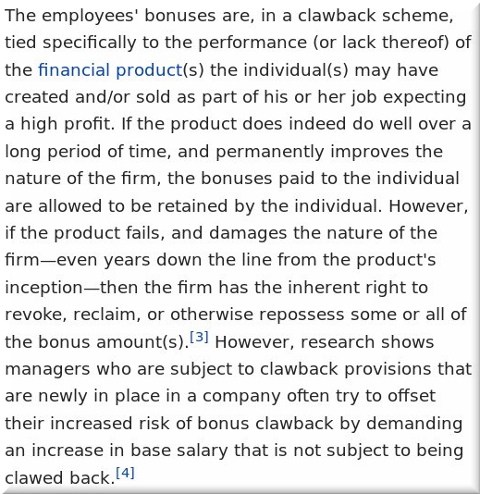
Reference: Clawback
Summary: The European Patent Office has become a servant of the rich and powerful (including large foreign corporations) and even its own employees now pay the price associated with misguided new policies (or ‘reforms’ as Battistelli habitually refers to these)
THE race to the bottom at the USPTO famously resulted in a rather defunct system — a problem officially (if not belatedly) recognised by GAO. It is now famous for patent trolls and the systematic crushing of startups (euphemistically associated with innovation). The status quo may be reasonably OK and generally acceptable for large corporations with a dedicated legal department. It’s also perfectly fine for patent law firms because when more patents get granted and there is more litigation, more money will inevitably flow their way. They are, in essence, the tax in the system or those who pocket the majority of the damages (or collateral damage).
“The status quo may be reasonably OK and generally acceptable for large corporations with a dedicated legal department.”The EPO under Battistelli is marching down the same path. It wants us to believe that the more patents, the merrier (or the more innovation). In practice, rich countries like Switzerland can better pursue (or afford to pursue) more patent applications. The system is more accessible to them because its costs are less prohibitive compared to east Europe (where the per-person salary/capital is vastly lower). Sweden is another example of this and The Local plays along in this marketing plot/ploy. What are the writers thinking and why are they doing this? The EPO did it with them a few months back, repeatedly even (when the so-called ‘results’ came out). Now they are claiming that Swedish people are “stronger [for] score in patent families [and] drives its upward movement.”
“patents != innovation,” told us a Scandinavian reader. It’s the person who sent this to us. Why are we still seeing these myths spread so widely? And why are we supposed to totally ignore intentionally hidden correlations like cause and effect (in reverse), which suggest perpetuation of monopolies and domination by means of services that are priced out of reach (to most)? That’s a rather broad discussion we covered here many times in the past.
“In return for this ‘service’, much compensation/pension money is promised (not offered) and guess who foots the bill.”In reality, the EPO currently discriminates against smaller member states and increasingly favours large corporations from other nations/continents. In return for this ‘service’, much compensation/pension money is promised (not offered) and guess who foots the bill. As the comment below put it: “The member states have agreed to foot the bill for the pensions. But this is on paper, and for pensioners the only addressee is the EPO. If the EPO unilaterally lowers the pensions, what is the recourse: at the end the ILO AT. In other words a dead end. If the EPO claims it has no money, it cannot be condemned to print it.”
As we stated before, there is apparent clawback already. Here is the comment in its entirety — a comment which was posted in relation to a long discussion about the promise of benefits to EPO staff (past, present and future):
One should not become paranoiac and think that money could go some political party in France. This is going too far.
It is however not the first time that the shear value of the RFPSS has given some appetite to the AC. In drawing out money out of the fund, the procedural fees could be kept constant for quite a while, if not lowered drastically. Then, with more crap patents granted as suggested in Berlin, more annual fees would come in. Who would be the beneficiaries? The member states, especially those with a lot of patents validated. The only unknown, but not one to be neglected is that the attitude of the users. I doubt they need a European patent, unitary or not, which is of the same level of the US one.
On the other hand, if the fund is constantly under performing, then it might not be worth keeping it. And we are back on the thoughts above here, why not simply use it to compensate procedural fees. This could be the ball starting rolling.
The member states have agreed to foot the bill for the pensions. But this is on paper, and for pensioners the only addressee is the EPO. If the EPO unilaterally lowers the pensions, what is the recourse: at the end the ILO AT. In other words a dead end. If the EPO claims it has no money, it cannot be condemned to print it. Nobody would ever lift a finger for a cast of privileged employees of an international organisation. That is exactly the position taken by one of the President’s minions, the PD Personal, Mrs Bergot to name her. They profited for a long time of lots of niceties and it is time for them to bleed…
It might sound far fetched as well, but such a hidden agenda would not surprise me from the President and its advisers.
Battistelli’s history as a public [sic] servant [sic] suggests that as a Republican with no empathy he’ll promise anything to get his way and even lie for some “greater good” (in his own mind). As one recent example of Battistelli’s “greater good”, consider his lobbying for the UPC, crackdown on quality control (of patents), and sending away of the boards — a move which is now being confirmed by the local media in Munich. To quote this new translation from SUEPO [PDF] with highlights in yellow (particularly where we are cited):
Munich’s European Patent Office may be planning a move to Haar
The European Patent Office in heart of Munich simply won’t settle down.
(Photo: dpa)
Advert
- According to SZ sources, the European Patent Office may be planning to transfer a department from Munich’s Inner City to Haar.
- The move to new premises, with a floor area of 11,000 square metres, would affect 200 personnel.
- A power struggle has long been raging within the Office, at the heart of which is the President Benoît Battistelli. Critics are concerned about his stringent reforms.
By Bernhard Lohr, Munich/Haar
Plans are clearly afoot at the European Patent Office in Munich to relocate the legal departments. The whole situation needs to be viewed in the context of a major reform of the legal structure, which the Member States of the European Patent Office Organization only decided on in June.
According to ZS sources, the Boards of Appeal, to which appeals can be lodged against decisions taken by the European Patent Court, are to be relocated to Haar. This will involve more than 200 employees, and an office surface area of 11,000 square metres.
Storm in the Glass House
The European Patent Office still will not settle down: New internal investigations aimed against staff representatives are causing concern – and upset. Because the Office’s own investigation department is overstretched, word has it that crisis specialists from London have been brought in to look into allegations of bullying. Katja Riedel has more …
No-one will officially confirm what is going on. Staff at the Real Estate Department of the Bavarian Insurance Chamber, which owns the office complex known as “8inOne” in Haar-Eglfing, standing empty now for a good two years, are keeping the name of the incoming tenants very much to themselves. The European Patent Office speaks of decisions which are
still pending. The local authorities will only refer to a well-known “non-profit organization” which will be coming to Haar. According to an internal E-mail, which is in the possession of the SZ, this is the European Patent Office.
In the Internet blog Techrights, contributors who are manifestly very well-informed about the inner life of the European Patent Office in Munich, are already engaged in intensive discussion about the move to the edge of the Bavarian capital.
Advert
Stringent reforms, suspensions, defamation: A power struggle is raging in the Patent Office
A power struggle has been raging for a long time within the Patent Office, with its 4000 employees in Munich alone, at the centre of which is the President, Benoît Battistelli. His opponents are opposing the stringent reforms he is seeking to introduce so as to streamline the Office. Battistelli recently suspended a patent judge, who according to the distribution of power should not have been subordinate to him, which in turn caused further upset in the Office. According to an internal investigation, the man is supposed to have used aliases in order to wage a defamation campaign against the President. The accused disputes the accusations.
A possible move to Haar is also being seen by staff members in this light. The word on Techrights is that this is a way of sending disgruntled personnel from the legal departments into “exile”; talk is of money being spent like water, and that personnel without much space should be taking priority.
According to insiders, the move is a done deal
Word has it, too, that staff in the departments affected, which are still sitting in the main building near the Isartor, have already been informed of the forthcoming move to Haar-Eglfing. The search for a suitable location for the Boards of Appeal is said to have involved eleven buildings in the general Munich area.
The closeness to the City and the airport, the actual fixtures and fittings of the building, and the easy access by public transport, are also supposed to have given the address at Richard-Reitzner-Allee 8 in Haar the edge in the search – “in the South-East of Munich”, as they say. According to the information on Techrights, the tenancy agreement is supposed to have already been signed as soon as the Finance Committee of the Patent Office approved the plan in October. The move is supposed to take place in July 2017.
Uprising against the Sun King
Staff at the European Patent Office in Munich are taking to the streets against their boss, Benoît Battistelli: He regards his people as of little consequence, and could even prevent
strikes. And that could mean that he is contravening European human rights. More from Katja Riedel and Christopher Schrader … Report
This matches up with what a spokesman from the Patent Office has been saying, who of course is not going to let anything slip about the move to Haar. Rainer Osterwalder says that the organization is “currently looking into possibilities for a new service building for its Boards of Appeal in Munich and the surroundings”. Once the “technical preparations” have been concluded, more formation will be forthcoming. The separate building is supposed to highlight the independence of the Boards of Appeal in the Patent Office Organization.
This issue is also said to have been discussed in the early part of the year with Bavarian Justice Minister Winfried Bausback. He is said to have been convinced that by having a separate building of their own for the Boards, the significance of Munich and Bavaria as focal points in Europe for patent legal procedures can be strengthened still further. On the other hand, it looks as if this positive view is not entirely shared by all the staff at headquarters.
Rainer Osterwalder refuses to just admit the obvious, but he begrudgingly acknowledges what the journalists were able to independently corroborate/confirm based on documents they saw. Where does that leave quality control, appeals, and oppositions? Well, far away from Battistelli, ‘sheltered’ in tighter offices with fewer members of staff and an uncertain future. A new article by Matthew Pinney from software patents proponents and lobbyists at Marks and Clerk (part of the patent microcosm that preys on EPO policies under Battistelli, including the UPC) was published in some of their media circles this week [1, 2]. It speaks of opposition procedures as follows:
The European Patent Office (EPO) opposition procedure allows any person to challenge the validity of a European patent within nine months of its grant. Oppositions are a commercially astute method for revoking others’ patents as an alternative or addition to court proceedings. However, the opposition procedure has historically taken up to three years after grant to reach a decision – even for ‘straightforward’ cases. Whilst a decision is pending, there is legal uncertainty for all parties.
On 1 July 2016, the EPO introduced a streamlined opposition procedure that simplifies the procedure so that opposition proceedings can be brought to a faster conclusion. The aim is that the Opposition Division will reach a decision within two years from grant. This is achieved by imposing reduced time limits on both the patent proprietor and the EPO.
Once an admissible opposition has been filed, the EPO invites the patent proprietor to respond with observations and any amendments to the patent. The streamlined procedure reduces the response time limit from six months to four months except in exceptional circumstances.
They are basically rushing things, which guarantees that quality will be further exacerbated/eroded/reduced and the service will prioritise profit over merit.
It’s sad to see the EPO repeating all those famous mistakes of the USPTO — mistakes that I spent over a decade writing about. Battistelli is certainly aware of the consequences of reduction in patent quality, but as we shall show in a later article, he denies it using his de facto think tanks.
“No amount of gloss can cover institutional rot and when the public discovers the rot, everyone suffers, including ordinary members of staff in the rotting institution.”Not only EPO staff is under attack from merciless and misguided management. Staff of WIPO too has been complaining and severely punished for that. Watch one who has just moved from human rights to WIPO, a serial violator of human rights. To quote IP Watch, “years ago Kwakwa also moved from UNHCR to WIPO, according to his bio. In the role of WIPO legal counsel, Kwakwa took a role once held by now-Director General Francis Gurry, and became known by some for his equanimity, knowledge, and an almost uncanny knack for navigating difficult situations that others could not.” With some very gross violations of human rights in there (under Gurry), one might wonder what Bontekoe is thinking here. It’s like the time the EPO hired Jana Mittermaier from Transparency International. No amount of gloss can cover institutional rot and when the public discovers the rot, everyone suffers, including ordinary members of staff in the rotting institution. Unless Battistelli is stopped, everyone at the EPO will suffer. This is why staff representatives are so sceptical of him. They too are eager to save the Office. █
Permalink
 Send this to a friend
Send this to a friend
08.18.16
Posted in America, Europe, Patents at 10:54 am by Dr. Roy Schestowitz
No more patent maximalism because US courts are tossing out a large proportion of granted patents (as do courts in Europe)
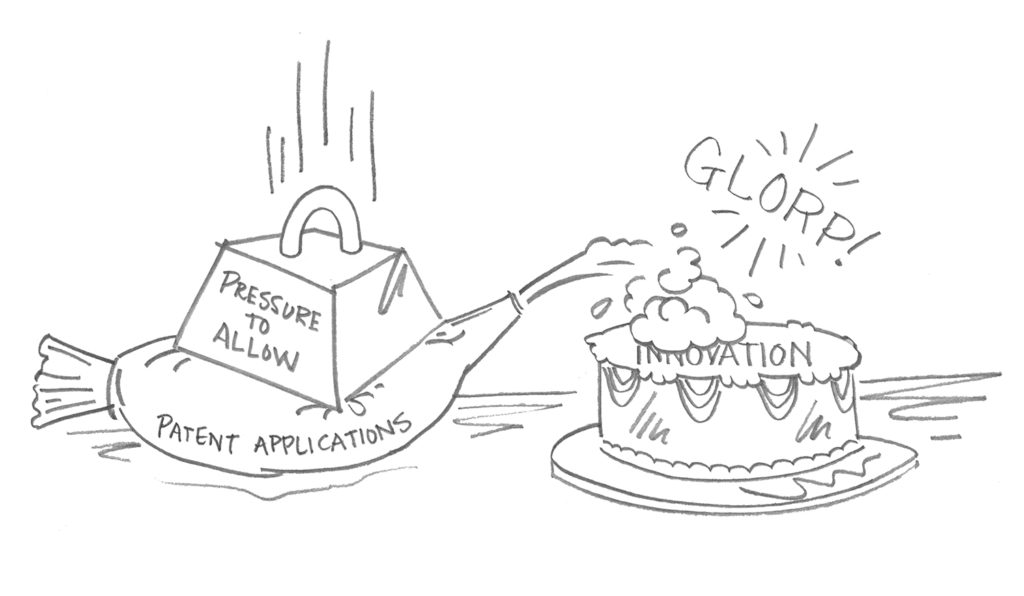
Credit: Matt Levy/CCIA
Summary: The United States is seeing the potency of patents — especially software patents (which make up much of the country’s troll cases) — challenged by courts and by the Patent Trial and Appeal Board (PTAB)
PATENTS (as originally conceived and foreseen) are not inherently evil, but if patents become applicable to everything under the Sun, then they serve no purpose other than to limit virtually every human activity, sometimes even natural activity (like patents on seeds, which increasingly limit reproduction).
Techrights opposes software patents because the discipline of software development cannot coexist with software patents. Just ask programmers about it. One programmer, Florian Müller, sent me a link this morning to an article I first saw last night. In it, Fenwick & West (which we cite a lot in relation to Alice) is claimed to have said 370 software patents have been invalidated by US courts (there’s much more of that in PTAB as well) after Alice. Here are the key parts:
Two years ago, when the U.S. Supreme Court invalidated Alice Corp.’s handful of patents on the concept of an electronic escrow arrangement, it ruled that taking abstract ideas—apparently including established methods of doing business like escrow—and implementing them on a computer doesn’t meet the standard of intellectual property. In its unanimous decision, written by Justice Clarence Thomas, the high court refused to precisely define what makes something an “abstract idea.” “We tread carefully,” Thomas wrote of the new standard for patents. Since then, however, lower courts, and the U.S. Patent and Trademark Office, have been using some pretty heavy boots.
Courts have invalidated more than 370 software patents under the new standard, according to data compiled by law firm Fenwick & West. District and appellate courts have thrown out two of three patents brought before them since Alice Corp. v. CLS Bank.
This means that there’s far lower an incentive to even bother suing with a software patent (or patents), never mind apply for one.
There have been lots of articles about Apple patents this week, mostly because of “iWatch”. Some articles mentioned software patents explicitly in that context. To give just one example, this new article states that “this latest [Apple] patent is more software orientated” and as longtime readers probably know, Apple has been using software patents against Linux since 2010 (in the courtroom; deterrence against Palm’s Linux-based operating system, using patents, predates that).
The good news is that reprieve is on the way and a lot of software patents are on their way out. The other day someone came to our main IRC channel and said, “the uspto is trying to stop my patent prosecution [...] I dont know what to do… who can help me? [...] i have a software patent that the uspto is trying to stop” (suffice to say, the USPTO has been the most pro-software patents among courts, boards and other ‘compartments’ in this profit-driven system).
The above story is not unusual. We have been hearing such stories for a while, but this one is a firsthand account. Here is a new very long rant from SightSound. “We’re the guys who invented the download music store, showed it all to Steve, and got rolled by Apple,” says the summary. Notice the use of the term “Death Squad for Patents” in the headline. “Death Squad” is a term popularised by the patent microcosm, which equates quality control/patent assessment with execution. It’s quite revealing, isn’t it? It’s rather likely that just as companies that sue Apple with software patents lose their case/s, so will Apple. Software patents are a dying breed. It’s easy to just file a patent lawsuit; winning one is another matter altogether, especially in this software patents-hostile atmosphere. That’s why the number of patent lawsuits fell sharply, based on firms that watch these figures closely.
Reaching out to the ITC (embargo using patents, even before the facts are known!), ResMed has just initiated “lawsuits in Germany and New Zealand, and to the US International Trade Commission against Fisher & Paykel Healthcare” [1, 2, 3, 4, 5, 6]. This particular case is not about software but about a device. Suffice to say, Germany does not (formally) have software patents altough in practice it’s most friendly towards them in Europe. As for New Zealand, it’s the latest battleground on this matter, probably along with India where this matter seems to be settled.
§ 101 in the US threatens to eliminate software patents in what is probably their last remaining home. Fish & Richardson PC has published this new analysis about the Court of Appeals for the Federal Circuit (CAFC), in which it says:
Patents that employ functional claiming even without using the words “means” will likely encounter greater scrutiny in the courts in light of this growing line of cases. That scrutiny is becoming more prominent under Section 112 jurisprudence, but is also apparent in the growing body Section 101 case law. The Court commented in the recentElectric Power Group, LLC v. Alstom S.A., No. 2015-1778 (Fed. Cir. Aug. 1, 2016) decision, in affirming a finding that a software patent is ineligible under § 101:
The district court phrased its point only by reference to claims so result-focused, so functional, as to effectively cover any solution to an identified problem…. Indeed, the essentially result-focused, functional character of claim language has been a frequent feature of claims held ineligible under § 101, especially in the area of using generic computer and network technology to carry out economic transactions.
Let’s face it, § 101 has changed everything. Matt Levy’s latest cartoon shows that he too now realises that patent scope, not just patent trolls, is a problem. In fact, patent trolls are often a symptom (or residue or side-effect) of patent scope gone awry, not to mention Texas courts openly bragging about pro-plaintiff bias. The cartoon from Levy is very much applicable to the EPO under Battistelli as well. Under pressure to grant patents all the time (the more, the merrier) they spoiled the whole system. “The GAO recently did a study on patent quality,” Levy explains. “It found that part of the reason so many patents are low quality is the pressures patent examiners are under to allow more patents.”
We already wrote about this study and explained how it relates to the EPO.
IP Watch has just published this guest post in which it’s suggested that number of unique patent assertions (e.g. lawsuits) is declining. AIA is cited as a possible cause. To quote:
Since AIA became effective in September of 2012, numerous studies have suggested the rise of patent litigation. While some surmised the post AIA joinder rule is causing the rise, many studies simply relied on just the number of cases filed per year to draw a conclusion about rising litigation.
We decided to take an additional step and look at another metric that may give us a better sense of the litigation landscape: the number of unique patent assertions per year. Essentially, this metric tells us how many unique patents are believed (by their owners) to be infringed in the US market.
As we know, after AIA, a single patent may now be asserted more than 100 times (e.g., Shipping and Transit LLC has filed more than 150 cases against many companies which, in most cases, only a single patent asserted (US7,400,970)). In our study, we counted this or similar cases once, because only a single patent was involved. As you can see in the above chart, the number of unique patents has been declining over the years.
2015 saw the highest number of filings. However, in terms of unique patents asserted, 2015 actually represented the lowest level since 2010. The number of unique patents asserted in 2015 had declined more than 23% from 2010.
It seems likely that AIA, together with PTAB that it brought, reduced confidence in all sorts of ludicrous software patents. The patent microcosm is obviously in denial about it, but the figures speak for themselves. here is Quinn Emanuel Urquhart & Sullivan LLP piggybacking or cherry-picking Enfish to pretend software patents are in tact (the tiring old spin). To quote their so-called ‘analysis’ (shameless self-promotion): “As two recent decisions from the Federal Circuit demonstrate, the law on patent-eligible subject matter, 35 U.S.C. § 101, remains largely unsettled. These decisions, Enfish and TLI Communications, represent some of the Federal Circuit’s most recent attempts to grapple with the appropriate application of § 101. Although these decisions are both software patent cases, they speak to issues that affect § 101 jurisprudence across a wide range of technologies, from software to diagnostic procedures to molecular biology protocols. In particular, Enfish and TLI Communications embody the recent judicial tendency to collapse the § 101 inquiry into the novelty inquiry under 35 U.S.C. §§ 102 and 103.”
But those are just two decisions among hundreds of others ruled in the opposite way. As we noted earlier this week, PTAB’s influence on CAFC (or vice versa) causes a certain panic in the patent microcosm. “For its part in the case,” wrote Patently-O about one case, “the Federal Circuit affirmed the PTAB determination without opinion” (there’s not much to argue about). “The patents at issue in the case are U.S. Patent No. 6,315,921 and U.S. Patent No. 6,395,195. They relate to an oxygen absorber used in meat packaging.”
PTAB is dealing not only with software patents, but when it deals with software patents they have very slim chance of survival because of § 101/Alice. Here is Patently-O remarking on PTAB again while citing Halo [1, 2]. To quote: “The Third Edition ads substantial coverage of managing litigation to deal with parallel proceedings at the PTAB, pleading standards, patentable subject matter, claim construction, enhanced damages following Halo, and reasonable royalty disputes. The treatise also covers recent developments in ANDA and biologics litigation, design and plant patent litigation, and litigation at the Federal Court of Claims. The appendices provide case management checklists and exemplars of patent management filings.”
MIP has also just mentioned Halo, noting that the “Federal Circuit and district court rulings since the Supreme Court’s Halo decision have made it clear a jury finding alone is enough for a judgment of willfulness. But an enhanced damages determination should ultimately be made by the judge weighing factors yet to be clarified.”
This case mostly impacts patent trolls that want to hop from one company to another and hoard money by shakedown. The following situation, as mentioned before by Patently-O, deals with scope of patents and how they’re self-limiting or self-invalidating (if the specified scope is too broad). It’s another case of patents that should not have been granted in the first place or are far too narrow to be useful. To quote the National Law Review: “This decision is an important reminder of the care that should be taken with all claim language, and indicates that extra caution may be warranted whenever any “consisting of” clause is used. It is not clear whether Multilayer could have modified the Markush clause with open-ended language, such as by reciting that “the inner layers comprise a resin selected from the group consisting of ….” Some examiners raise indefiniteness rejections when a claim uses both “comprising” and “consisting of ” language, but not all combinations of such “open” and “closed” language are improper.”
What this basically says is that you cannot get a patent to cover everything under the Sun or claim in an ad hoc fashion that it magically covers unspecified claims. Any patent system which places no restrictions on scope would be self-deprecating. To give two more examples of cases covered by Patently-O, in one case there was “key prior art in the obviousness case [...] Chinese patent publication that discloses minocycline…”
In another case the lawsuit got thrown out because the plaintiffs “waited a year to serve the motion. Courts hold that the motion should be served as soon as practicable. As a result, the court held the motion was properly denied as having been served in an untimely fashion.”
“Frivolous” is the word Patently-O uses to describe this lawsuit; another way might be SLAPP, as the intention is to discourage some activity, later (a year later) to be followed by a surprise motion. What is this, Mafia tactics? █
Permalink
 Send this to a friend
Send this to a friend
Posted in Europe, Patents at 7:12 am by Dr. Roy Schestowitz
Pretending he’s not seeing the basis and rules of the Office?
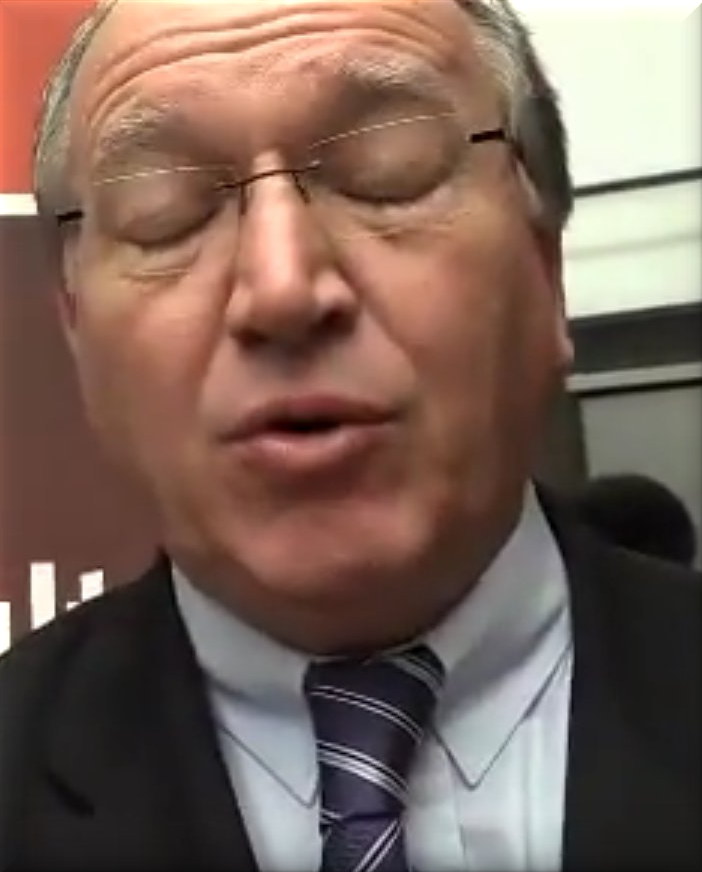
Summary: The European Patent Office is showing its utter contempt — not just disregard — for the very fundamental rules that put it in its place and brought it into existence
IT IS no secret (not anymore, but it was supposed to be a secret) that the Battistelli regime, having an unscrupulous party with EPO budget, pays over a million Euros per year to a US-based PR firm (notorious for its fracking lobby here and elsewhere in the world). They are silencing if not brainwashing journalists (even pushing ‘material’ to them). This PR firm is already funding a pro-UPC event in the US, which is probably an ethical breach for all sorts of reasons. This conscienceless, unprincipled management is a total disaster to what was once a reputable Office.
The EPO has just promoted “think tanks” (basically something like FTI Consulting for fracking and EPO ‘damage control’) and it is in think tank mode (disguised as “seminar”) when using the “ICT” weasel word — a word that we alluded to earlier this week (a vague way to allude to software patents). In this tweet from yesterday the EPO gets even more explicit about it. It wrote: “ICT patents seminar in New York, 14 Sept. Experts discuss Unitary Patent, PCT & software patents. Register Now! http://www.epo.org/learning-events/events/conferences/ictseminar2016.html …”
“”Online Filing users,” as the above puts it, pretty much must be Microsoft customers, i.e. paying clients of some serial abuser from another continent.”The Battistelli-run EPO is still promoting software patents and the UPC. They have no sense of shame and in order to meet notorious goals (demolishing the EPC and patent scope) they’ll even go abroad and do their lobbying behind closed doors (or hugely expensive entrance fees). The EPO promotes the above event every other day or so. There are at least two more such events (with “ICT”) in the pipeline, based on the EPO’s Web site. Another EPO event was mentioned by IP Kat yesterday. To quote: “EPO Online Services Workshops. A series of workshops introducing the new online filing service at the EPO will be held in London on 13-14 September, 18-19 October and 29-30 November. The workshops are aimed primarily at Online Filing users, professional representatives and support staff/records department staff who are familiar with the basic functions of Online Filing. For more information and to register, see here.”
“Online Filing users,” as the above puts it, pretty much must be Microsoft customers, i.e. paying clients of some serial abuser from another continent. The same goes for UPC. That’s a despicable aspect of the EPO which we covered here several times before. It makes the word “European” abundantly farcical in the EPO acronym.
In other news, the EPO’s PR strategy becomes ever more pathetic by the day. More EIA 2017 ‘spam’ (direct messaging that’s repetitive) from the EPO can be seen in the account right now [1, 2, 3, 4], as if broadcasting to all people [1, 2, 3] is not enough for them. How low will these people stoop and when will they realise that the more they do to save face/cover up Battistelli’s behind, the worse things will get? It has culminated in a crisis already and it’s turning into a a full-blown ‘constitutional crisis’ at the EPO — something from which the EPO might never be able to recover (even after Battistelli leaves). █
Permalink
 Send this to a friend
Send this to a friend
Posted in Europe, Patents at 6:54 am by Dr. Roy Schestowitz
Symptoms of a severe ‘constitutional crisis’
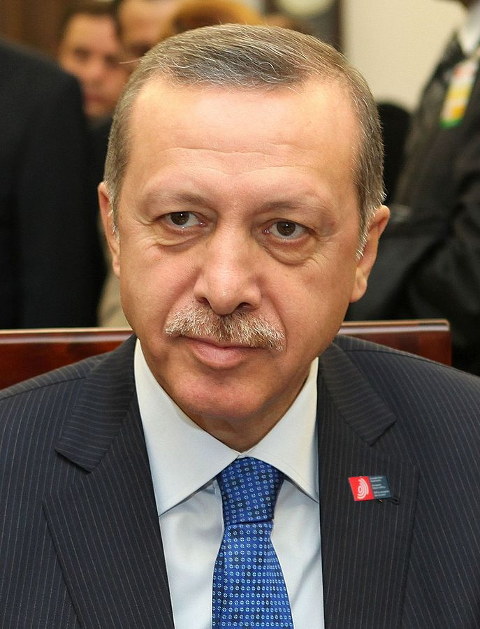
When power-hungry people simply decide that laws and rules don’t apply to them…
Summary: The ‘constitutional crisis’ at the European Patent Office in the context of Turkey, which has signed “the EPC and as such recognises the competence and the decisions of the institutions which have been introduced in the convention.”
THE moral and ethical erosion at the EPO‘s top-level management is very apparent. Using the pretense of “emergency” human rights are suspended and the rules are made up for retaliation purposes as Battistelli goes along and breaks his very own rules. The EPO just ignores the EPC right now.
An article by Selin Sinem Erciyas and Ozge Atilgan Karakulak from Gun & Partners, published a fortnight ago in a lawyers’ site, makes timely comments regarding the Recep Tayyip Erdoğan-run Turkey being part of the EPO/EPC. There are many parallels these days between what Battistelli does and what Erdoğan does, including attacks on reporters. “The European Patent Convention (EPC)”, it says, “is a part of Turkish national domestic law and is enforced in Turkey under Article 90 of the Turkish Constitution. Furthermore, it was formed under international agreement and as a result cannot be claimed as unconstitutional.
“The EPC law can be applied directly in Turkey and therefore it is legally binding. Alongside other member states, Turkey also declared and signed the EPC and as such recognises the competence and the decisions of the institutions which have been introduced in the convention. It is assumed that the member states are not able to declare their commitment for certain bodies of the European Patent Office (EPO), such as decisions only made by the examination division or appeal board. This may seem an unusual statement, however, it should be stressed as it is one of the most important proceedings in Turkey, it has been argued by IP courts that EPO decisions are only binding for Turkey if the decision can be grounded on an explicit provision in the EPC.”
Looking at recent IP Kat comments regarding the detachment from the EPC at the EPO, we find the following:
I am thinking of the relations with the work-rules regulating organs of the host countries (Arbeitsinspectie, Gewerbeaufsicht,…)
Article 18 of the Seat Agreement with the Netherlands makes provision for a Joint Consultative Committee which shall meet “at least once a year”:
(1) A Joint Consultative Committee shall facilitate the implementation of this Agreement and may address other administrative issues through consultations between the relevant authorities of the Kingdom of the Netherlands and the Organisation. It shall meet at least once a year and may convene at any other time at the request of the Government or the Organisation.
(2) The Chairman of the Committee shall be appointed by mutual agreement between the Government and the Organisation.
It actually took a while for this to show up, as explained by the latter two comments:
Article 18 of the Seat Agreement with the Netherlands establishes a Joint Consultative Committee which “shall facilitate the implementation of this Agreement and may address other administrative issues through consultations between the relevant authorities of the Kingdom of the Netherlands and the Organisation.”
The JCC “shall meet at least once a year and may convene at any other time at the request of the Government or the Organisation.”
Ho hum. I keep trying to post a comment about Article 18 of the Seat Agreement with the Netherlands which establishes a Joint Consultative Committee.
But for some reason it doesn’t make it through the IPKat comment filter …
These filters can be truly iffy at times.
In any case, the point made above is that something is absent in this process. The EPO cannot go on like it currently does and congregations of the Administrative Council, which is effectively in Battistelli’s pocket, are no remedy. They are part of the problem after the Audit Committee got destroyed by the Administrative Council at the behest of Battistelli. There is clearly a ‘constitutional crisis’ at the European Patent Office, not just a crisis. The International Labour Organisation (ILO) has only just begun catching up with this. █
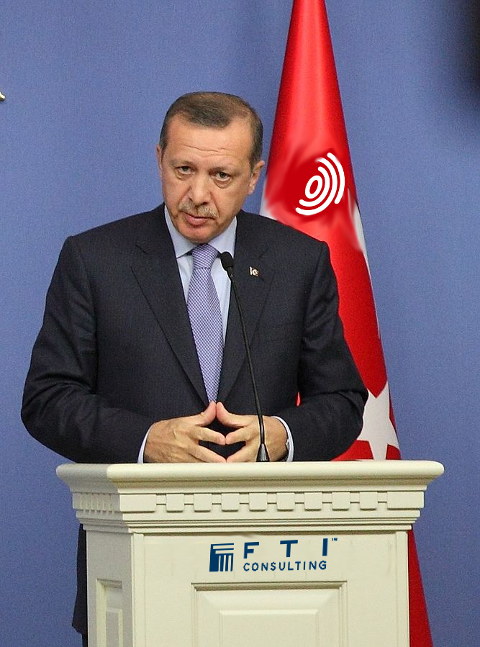
Original photo: Erdoğan, 2012
Permalink
 Send this to a friend
Send this to a friend
08.16.16
Posted in America, Europe, Patents at 12:22 pm by Dr. Roy Schestowitz
“James Logan freely admits that he’s never made a podcast,” according to USA Today (source of the photo below)

Summary: Jim Logan of Personal Audio (a notorious Texas-based patent troll) is still fighting with his bogus patent, having already caused enormous damage with a single software patent that should never have been granted in the first place (due to prior art, not just Alice)
THE USPTO‘s examiners have been so eager to grant patents and perhaps so out of touch that they granted a patent on podcasting to some parasite, in spite of extensive evidence of prior art (even the Patent Office has acknowledged this by now). As a result, many innocent people with a podcast had been hit (extorted) until the EFF stepped in to help. We last wrote about this earlier in the month and it turns out that after years of disputes the patent troll (which is the patent holder) is still not giving up. Just look what a monumental mess just one single erroneous grant by the USPTO has caused!
“Just look what a monumental mess just one single erroneous grant by the USPTO has caused!”Joe Mullin says that the “[p]odcasting patent troll fights EFF on appeal, hoping to save itself” (this patent is pretty much its entire capital/existence*). To quote:
The owner of a patent on podcasting is hoping to snatch victory from the jaws of defeat.
Personal Audio and its owner, Jim Logan, lost their patent last year after lawyers from the Electronic Frontier Foundation showed the US Patent and Trademark Office that various types of Internet broadcasts pre-date the patent, which claims a 1996 priority date.
The podcasting patent became famous and received national media attention after it was used to sue several high-profile podcasters, including Adam Carolla, who raised $500,000 and fought back for a time before reaching a settlement in 2014. Personal Audio had also sued several big TV networks, and its case against CBS went to a jury in September 2014. The jury found the patent valid and awarded Personal Audio $1.3 million, a victory that Personal Audio’s lawyers have noted in their appeal arguments.
The controversy is now in the hands of the US Court of Appeals for the Federal Circuit, the court that handles all patent appeals. A three-judge panel heard arguments over the matter earlier this month.
Let this become a famous example of why software patents are a great menace to everyone, not just to developers. Sites of patent lawyers continue to advocate for software patents under the guise of ‘analysis’ (cherry-picking by patent lawyers who still resort to Enfish, despite admitting that it changed little or nothing at all) and WatchTroll, a vocal proponent of software patents, asks a loaded question in his latest headline, “Would Monopoly® be patent ineligible under Alice?”
“There should be absolutely no software patents in Europe (no matter what Battistelli does to ruin the EPO and crush the EPC these days), especially now that the USPTO demotes these.”Here again is the regression/resort/retreat to Enfish and BASCOM hype, as if two decisions among many hundreds will somehow salvage software patents as a whole. To quote WatchTroll: “The application of the Supreme Court’s decision in Alice v. CLS Bank by the Federal Circuit has been disappointing, to say the least. There have been some rays of hope for innovators with decisions in DDR Holdings, Enfish and BASCOM, but these bright spots shine so radiantly because they are scattered in a sea of despair.”
Despair to who? To patent law firms, i.e. not to actual development powerhouses and/or programmers.
We regret to see the Battistelli-run EPO being lured into software patenting in spite of the EPC. There are already misplaced priorities which favour large US-based companies at the EPO and the EPO increasingly uses the term “ICT”, which some can interpret as a vague insinuation/synonym of software patenting. See this pair of new tweets [1, 2] that ask: “Know how US & European practice differs for ICT applications?”
There should be absolutely no software patents in Europe (no matter what Battistelli does to ruin the EPO and crush the EPC these days), especially now that the USPTO demotes these. “Ever been to EPOPIC? Here are this year’s topics,” the EPO now writes in relation to an upcoming event. Looking at the sidebar under “key events” we see “ICT seminar 2016″ and “Indo-European conference on ICT-related patents 2016″, so there’s clearly some kind of a trend developing. The UPC threatened to bring software patents to Europe (so said multiple domain experts) and also bring patent trolls like Jim Logan. It’s a true danger when people like Battistelli race to the bottom in the name of “production” (even if it’s faked). █
_______
* Wikipedia says the firm, which is a “Texas-based company,” was “formed to enforce two patents applied to podcasting.” It’s described as a “patent holding company” (euphemism for troll).
Permalink
 Send this to a friend
Send this to a friend
Posted in Courtroom, Europe, Patents at 10:28 am by Dr. Roy Schestowitz
 Summary: Things are becoming ever more troublesome at the EPO as the Administrative Council enjoys inaction from the International Labour Organization (ILO), in spite of its role in destroying much-needed oversight at the behest of Battistelli
Summary: Things are becoming ever more troublesome at the EPO as the Administrative Council enjoys inaction from the International Labour Organization (ILO), in spite of its role in destroying much-needed oversight at the behest of Battistelli
IN our only article about the EPO yesterday we mentioned the RFPSS meeting. Things are eroding if not disintegrating at the EPO and it’s taking its toll on staff while no effective oversight exists anymore. Someone in IP Kat‘s comments remarked on the contents of yesterday’s material as follows:
On the subject of pensions, there is some interesting commentary from the CSC on the latest RFPSS meeting.
http://techrights.org/wp-content/uploads/2016/08/sc16129cp.pdf
“The Office thus unnecessarily lowers the probability of reaching our long-term objective for the return on investment, thereby deliberately creating a situation that could be used to trigger further major reforms.
The governance in terms of risk monitoring is still unclear through inadequate role clarity, while such governance deficiencies are recognised as often leading to under performance”.
If one were inclined to believe in conspiracies, the actions of the Office (including eliminating independent oversight of finances, and seemingly ensuring “underperformance” of the pension reserve fund) could all be interpreted as preparation for an attempt to sequester the approx. EUR7,000 million in the reserve fund.
In such a hypothetical conspiracy, the Office would “manufacture” excuses to cut / eliminate pension benefits to those who should be the beneficiaries of the RFPSS fund, only to then conduct a new study that miraculously discovers a massive surplus in that fund. The conspiracy would then conclude with the pension fund surplus being “liberated” by the Office.
Of course, this is all very far-fetched and so ought to easy to dismiss as nothing more than pure speculation. Indeed, a far more plausible explanation is that there is no plan for a cash-grab, just an attempt to deal with the pension liability issue that I have discussed before. Still, the effectively lawless behaviour of the Office in recent years (especially when it comes to matters of staff rights / benefits) does make one wonder…
Someone then responded to that as follows:
I have been entertaining similar suspicions since before Mr. Battistelli’s too office, when his immediate predecessor generously spouted expressions like “fit for the future”, “doing nothing is not an option” (in other words: TINA — but what is the problem in the first place?) and imposing the IFRS charade. I would however employ a much stronger word than “sequester”.
The questions are IMO: who would be the happy beneficiaries of that heist, how would the loot be split among them, and how would it be transferred out of the EPOrg while maintaining appearances?
As we stated yesterday, we have no accounting expertise here (not even in our IRC channels), so we need to rely on input from those who understand such matters and can interpret the financial reports of the EPO. The following remark bemoans Battistelli's political background, which basically makes him unfit (as per qualifications) for the post he has held for over half a decade. To quote:
Don’t forget that there is a French Presidential election campaign coming up in 2017.
https://en.wikipedia.org/wiki/French_presidential_election,_2017
“Primaire à droite : les Amis de Sarkozy lancent un appel aux dons”
http://www.leparisien.fr/politique/primaire-a-droite-les-amis-de-sarkozy-lancent-un-appel-aux-dons-11-04-2016-5704991.php
This is why people who hold elected office for political parties should never be put in change of international organisations with large cash surpluses and no effective oversight.
Right now at the EPO there is virtually no accountability, as pointed out in another thread in relation to a subject we first covered here 2 years ago:
Perhaps we will never know. With the full knowledge and approval of the AC, one of BB’s first actions as president was to disband the only body (the Audit Committee) that could have provided transparency / independent oversight in connection with the EPO’s finances.
The ILOAT also placed its seal of approval on this dastardly act in Judgment 3698:
http://www.ilo.org/dyn/triblex/triblexmain.detail?p_lang=en&p_judgment_no=3698&p_session_id=122&p_language_code=EN
“The authority to establish or abolish the Audit Committee was vested in the Administrative Council alone, and these decisions did not infringe the complainant’s rights in any way, regardless of his role in the EPO.”
Judgment No. 3698 (originally in French) is dated a month ago (when many decisions came out, more than 80% of which rules against the EPO's management) and it relates to a decision we covered here last month. It’s Bernard Paye's complaint to ILO, which gave him a Pyrrhic victory many years too late. Here is the text of this decision with highlights in yellow. The complaint was made by “the principal author of the proposal to establish [the A]udit [C]ommittee,” based on the text:
Organisation internationale du Travail
Tribunal administratif
International Labour Organization
Administrative Tribunal
Registry’s translation,
the French text alone
being authoritative.
P.
v.
EPO
122nd Session
Judgment No. 3698
THE ADMINISTRATIVE TRIBUNAL ,
Considering the complaint filed by Mr B. Y. P. against the European Patent Organisation (EPO) on 15 March 2013 and corrected on 7 May 2013, the EPO’s reply of 5 March 2015, the complainant’s rejoinder of 24 April and the EPO’s surrejoinder of 31 July 2015;
Considering Article II, paragraph 5, of the Statute of the Tribunal; Having examined the written submissions and decided not to hold oral proceedings, for which neither party has applied;
Considering that the facts of the case may be summed up as follows: The complainant challenges the abolition of the Audit Committee of the EPO’s Administrative Council.
On 30 June 2011, following a proposal by the President of the European Patent Office, the Administrative Council adopted decision CA/D 4/11 abolishing the Audit Committee, one of its subsidiary bodies, with immediate effect. On 28 September 2011 the complainant, who was then Head of Internal Audit (Principal Directorate 0.6 of the European Patent Office), and Ms H., who chaired the Staff Committee, filed an internal appeal against this decision. They complained, inter alia, that the General Advisory Committee had not been consulted prior to the adoption of the challenged decision. In November 2012 Ms H. withdrew her appeal. Having heard the complainant, the Appeals Committee of the Administrative Council unanimously recommended on 11 December 2012 that his appeal be dismissed, considering, in particular, that the challenged decision had not been taken in breach of any “applicable legal provision”. By a letter of 20 December 2012, which constitutes the impugned decision, the complainant was notified that the Administrative Council had decided to dismiss his appeal.
In his complaint filed on 15 March 2013, the complainant asks the Tribunal to quash the impugned decision as well as decision CA/D 4/11 and to order the EPO to submit the initial proposal of the President of the Office to the General Advisory Committee. He also seeks compensation in the amount of 30,000 euros for the moral injury that he considers he has suffered and an award of costs.
The EPO submits that the complaint is irreceivable, in particular on the grounds that the complainant is impugning a general decision that does not adversely affect him. In the alternative, it asks the Tribunal to dismiss the complaint as unfounded.
CONSIDERATIONS
1. The Tribunal has jurisdiction under Article II, paragraph 5, of its Statute to hear complaints alleging “non-observance, in substance or in form, of the terms of appointment of officials and of provisions of the Staff Regulations”. In consequence, when “[t]he complainant does not allege the non-observance of any of the terms of his appointment or of any of the Staff Regulations applicable to him”, his complaint must be held to be irreceivable (see Judgment 2952, under 3).
2. The Tribunal observes that the complainant does not allege any violation of the terms of his appointment or of staff regulations that are applicable to him. His case does not relate to his administrative status but rather to the organisation of the EPO, his employer, for which he is plainly not responsible. The fact cited by the complainant that he was “the principal author of the proposal to establish [the A]udit [C]ommittee” that was subsequently abolished does not grant him any right to intervene in a decision to maintain that subsidiary body or not.
The authority to establish or abolish the Audit Committee was vested in the Administrative Council alone, and these decisions did not infringe the complainant’s rights in any way, regardless of his role in the EPO.
3. It ensues from the foregoing that the complaint, which the Tribunal is not competent to hear, is irreceivable and must be dismissed.
DECISION
For the above reasons,
The complaint is dismissed.
In witness of this judgment, adopted on 28 April 2016, Mr Claude Rouiller, President of the Tribunal, Mr Patrick Frydman, Judge, and Ms Fatoumata Diakité, Judge, sign below, as do I, Dražen Petrović, Registrar.
Delivered in public in Geneva on 6 July 2016.
(Signed)
CLAUDE ROUILLER
PATRICK FRYDMAN
FATOUMATA DIAKITÉ
DRAŽEN PETROVIĆ
The above relates to our previous post about complicity of the Administrative Council, in this particular case actively removing accountability or oversight from Battistelli, which the Council appears to be in bed with.
Citing another case, we have already shown how Battistelli worked against the European Patent Convention (EPC). How Battistelli can get away with all this isn’t something we can now defer to the Founding Fathers of the EPO anymore (most of them are deceased by now). █
Permalink
 Send this to a friend
Send this to a friend
Posted in Europe, Patents at 9:35 am by Dr. Roy Schestowitz
 Like FIFA coverups but much broader
Like FIFA coverups but much broader
Summary: A recollection of events prior to the latest Administrative Council meeting, where Benoît Battistelli’s failings and accountability for failing to correct them never even came up
“COMPLICITY” is increasingly becoming the correct term by which to describe the Administrative Council with its national delegations (who are supposed, at least in principle and in theory, to hold the EPO accountable). Disinterested or self-interested would be a more polite way to put/frame it. If they cared, they would have fired Battistelli already. Even if they kept their word or promise, he would be sacked by now. No secret endowments to this autocrat.
“Watch what Erdoğan is doing in Turkey right now (against military generals, judges, journalists etc.) to better understand how Battistellites (Benoît along with his largely French circle) are running the EPO.”Like in most autocratic regimes, control is exerted through fear and the Erdoğan- or Duterte-like Battistelli scares people at all levels, including delegates whom he bullies in plain sight (maybe to make an example). No wonder some top managers are leaving and others, who reportedly (based on rumours) thought about leaving, say the darnest things on TV in order to cover Battistelli's back.
Watch what Erdoğan is doing in Turkey right now (against military generals, judges, journalists etc.) to better understand how Battistellites (Benoît along with his largely French circle) are running the EPO. It’s something to be expected from third-world nations, but it’s happening in Bavaria, traditionally known for class and sophistication. Fear of Battistelli, including fear of firing him (long overdue), is apparent. Developments prior the latest Administrative Council meeting suggest that there was not a reversal of their position but rather abstinence from the topic of Battistelli’s abuses (breaking rules, including his own).
“The last B28 [Board 28, which privately admits there's an EPO crisis] meeting took place just ahead of the BFC meeting at the end of May,” we learned. “The B28 focused once again on following-up on the consequences of the resolution adopted by the Administrative Council on 16 March 2016. Of particular interest and importance for staff was whether there was any progress in the disciplinary matters, which should be fair and seen to be fair. According to the summary of conclusions of this meeting (B28/8/16), no tangible progress could be reported on then. In June, the President rejected the requests for review of Malika Weaver and Ion Brumme and thereby reconfirmed their disciplinary sanctions. Later the same month, the President apparently interfered with the independence of the Enlarged Board of Appeal proceedings, thereby preventing them from ruling on the merits in the case of the Judge accused of misconduct. Just a few days ahead of the Council meeting, the President suspended Laurent Prunier in The Hague, a further staff representative and SUEPO official to be sanctioned.”
“How convenient for Battistelli, who is no longer so far from his retirement anyway (maybe he will join Sarkozy with his political career thereafter).”One might expect, based on any of the above actions, that Battistelli would be considered in violation/deviance from the requirement set to him by the overseers. How can they possibly reconcile all this? Simple; just don’t mention any of that at all. That is precisely what happened at the meeting, as we wrote at the time. Based on text that was shown to us: “During the AC [Administrative Council] meeting, the Council was informed by both internal and external stakeholders on the flawed consultation process leading to the documents presented for their approval. As for the proposals themselves, among the more obvious deficiencies in the Boards of Appeal reform, the theme had been expanded to include post service employment restrictions and relocation and, according to the President, to be treated as a package. Finally, a review of the Investigation and Disciplinary Procedures which were originally on the agenda were postponed.”
That’s right. Postponed. 3 months! How convenient for Battistelli, who is no longer so far from his retirement anyway (maybe he will join Sarkozy with his political career thereafter). To quote further: “The circumstances leading to the disciplinary cases against staff representatives and Union Officials have been repeatedly raised with the delegations before and after the confidential Council session. [...] The only mention made in the summary of the C-session was that “the Council resolution will be followed up in one of the next meetings”.
This incredible procrastination shows that the Council is not at all interested in restoring stability to the Office. Put another way, the delegates are complicit; they’re a bunch of obedient cowards, maybe some of them paid for it.
In the mean time, judging by the spammy activity of the Twitter account this summer* (the PR team just keeps spamming for EIA 2017 e.g. [1, 2, 3, 4]), there is the assumption that Battistelli will survive another year. If that actually happens, how many workers will even stay at the Office now that resignations and early retirements skyrocket? Rumours we heard say that Battistelli wants to extend the term of Topić’s EPO appointment in spite of the criminal charges against him (not to mention extreme unpopularity among staff, whom he attacks like he attacked staff in Croatia). █
_____
* Or just talking to everyone in general, e.g. [1, 2].
Permalink
 Send this to a friend
Send this to a friend
Posted in Courtroom, Europe, Patents at 8:49 am by Dr. Roy Schestowitz
Summary: Self-explanatory graphs about the state of the justice [sic] system which is prejudiced towards/against EPO workers, based on internal reports
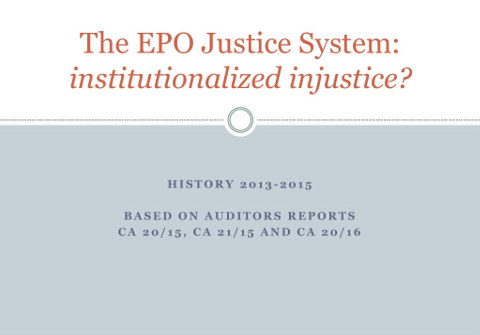
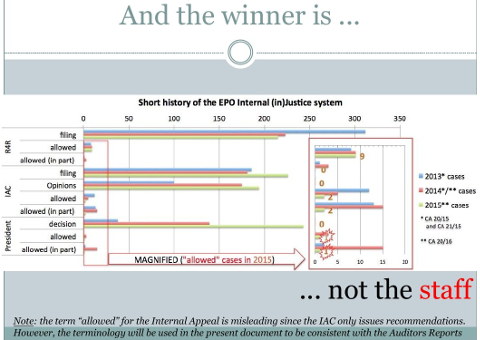
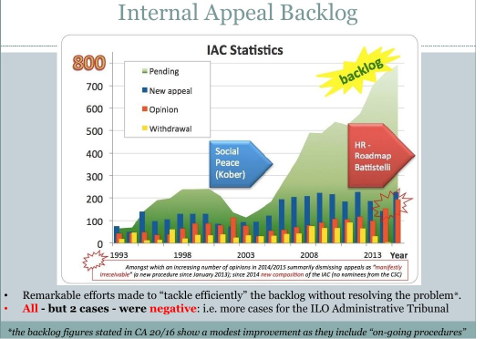
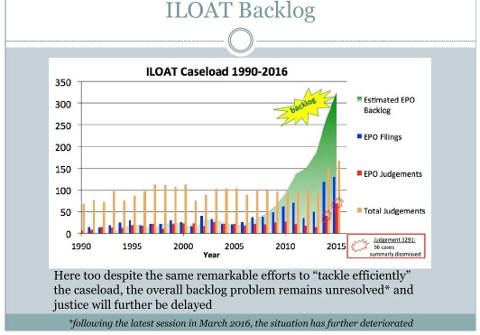
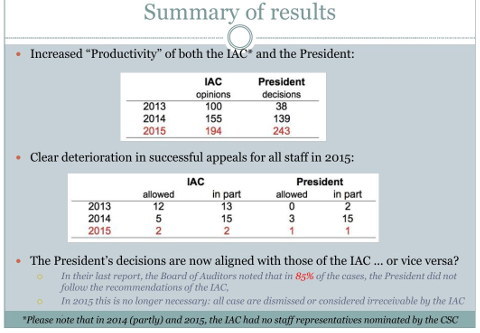
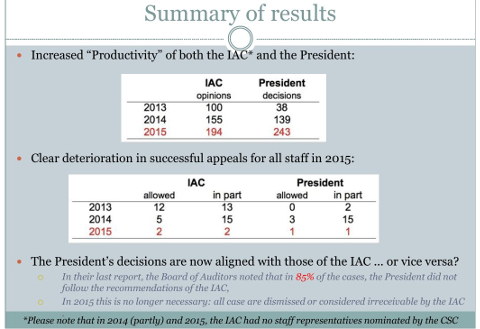
If EPO management cannot guarantee justice to its own staff, will it ever guarantee justice to patent holders (defendants and plaintiffs)?
Permalink
 Send this to a friend
Send this to a friend
« Previous Page — « Previous entries « Previous Page · Next Page » Next entries » — Next Page »







 Summary: Things are becoming ever more troublesome at the EPO as the Administrative Council enjoys inaction from the International Labour Organization (ILO), in spite of its role in destroying much-needed oversight at the behest of Battistelli
Summary: Things are becoming ever more troublesome at the EPO as the Administrative Council enjoys inaction from the International Labour Organization (ILO), in spite of its role in destroying much-needed oversight at the behest of Battistelli





















 Content is available under CC-BY-SA
Content is available under CC-BY-SA